Are you facing challenges in maximizing the efficiency and productivity of your teams? Look no further! The success of your software development projects often depends on your team’s collective drive and expertise — as well as the leadership of your project managers (PMs).
You can benefit extensively from having a motivated and dedicated team, including through enhanced productivity, leading to timely project completion and faster delivery of high-quality solutions. As a result, your clients will experience improved communication, a superior quality of products and services, higher morale among team members, and innovative solutions. But how can you ensure that your distributed teams are motivated and dedicated to delivering exceptional results?
This article will give you actionable insights to create a thriving work environment where your IT teams are motivated, collaborative, and driven to achieve project goals. We will talk about different types of motivation, explore practical techniques for boosting team spirit, and address common challenges that can hinder team performance so you can make sure your PMs are equipped with the latest tactics.
Whether you’re a representative of a product company or a software development firm, join us as we share our working strategies to overcome common challenges and unlock the full potential of your workforce.
Contents:
Understanding the role of motivation in IT project management
Motivation is the internal drive that compels team members to exert their full effort, creativity, and commitment toward achieving project goals. It’s the fire that ignites a passion for excellence and a desire to overcome challenges.
When managing distributed teams, maintaining clear goals and a strong sense of purpose becomes even more critical compared to working with a traditional in-house team. As your PMs are able to help your teams find and maintain motivation, they will remain passionate, collaborative, and driven to achieve project success even when the developers are miles apart. When members of a distributed IT team are effectively motivated, they can maintain productivity for a long time, completing tasks in their schedule and meeting objectives. Moreover, with proper motivation, team members may become more invested in the project’s outcome, sharing accountability and showing initiative to come up with creative approaches.
Here are some of the impacts that motivation can have on team productivity and project success:
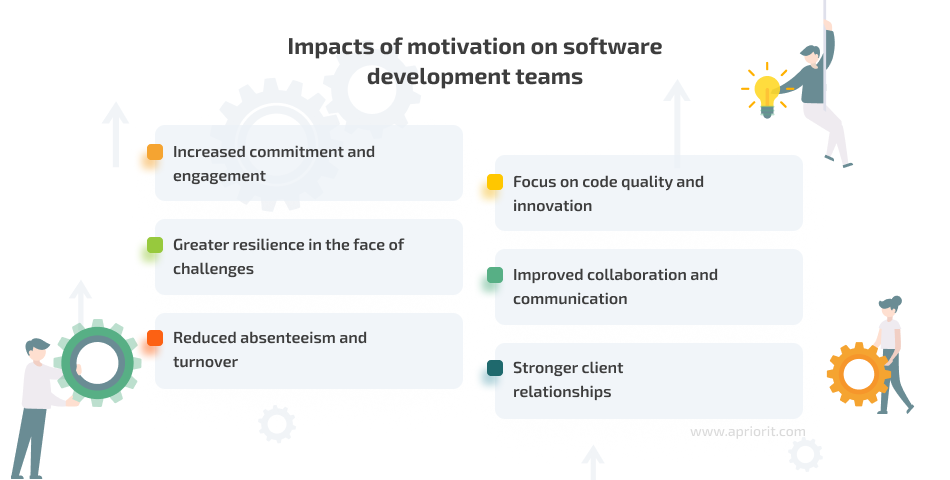
Increased commitment and engagement. A motivated team is laser-focused on achieving project goals. They approach tasks with a higher level of engagement, leading to better problem-solving, improved decision-making, and boosted creativity in coming up with fresh ideas.
Focus on code quality and innovation. When individuals are effectively motivated, they’re more likely to go the extra mile, striving for quality and seeking innovative solutions. They will also make fewer errors, focus on project outcomes, and provide you with a competitive edge on the market.
Greater resilience in the face of challenges. Complex IT projects are rarely smooth sailing. A motivated team possesses the inner strength and determination to persevere through obstacles. They’re more likely to view challenges as opportunities for learning and growth, fostering a collaborative spirit, structuring the problems, and approaching them with a clear plan and understanding of what to do.
Improved collaboration and communication. When team members are motivated, they’re more likely to share ideas openly, work collaboratively towards solutions, and provide constructive feedback. This creates a positive environment where knowledge is readily shared, leading to better decision-making and problem-solving as a team.
Reduced absenteeism and turnover. Motivated employees find their work more fulfilling and are less likely to miss work or seek employment elsewhere. This leads to project continuity, reduced onboarding costs, and strong institutional memory as developers can leverage past experiences for future projects.
Strong client relationships. A motivated team is more likely to go above and beyond to meet client needs and expectations. As a result, your team will have strong client relationships built on trust, clear communication, and a genuine commitment to project success.
Motivation isn’t just a feel-good factor; it’s a strategic advantage for your product on the market. By encouraging a culture of internal motivation within dedicated teams, you can empower people to reach their full potential, ultimately leading to successful project delivery for your clients.
Empower your IT projects with Apriorit’s dedicated teams
Reach out to get the work done and achieve your business goals with the help of our expert developers and team managers!
Two major types of motivation
When it comes to complex software development projects, an effective and knowledgeable team is the engine that propels success. But just like any engine, it needs the right fuel to perform at its best. Motivation is one of the crucial factors that make or break a team. There are two main types of motivation that can influence a dedicated team:
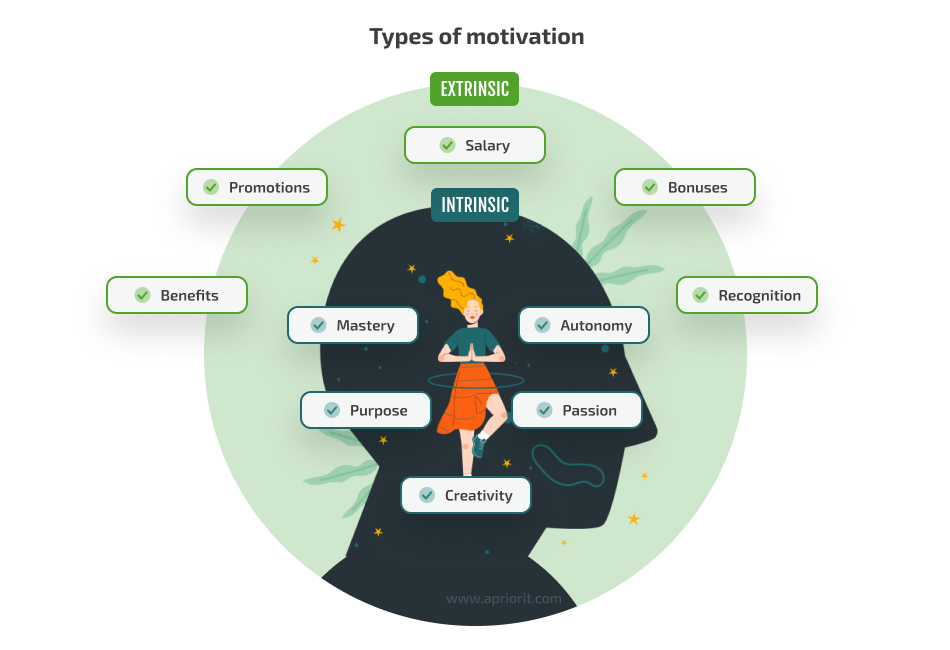
- Intrinsic motivation. This is the internal drive that comes from within the individual. It’s fueled by a sense of enjoyment, accomplishment, learning, and growth. When working on a software development project, intrinsic motivation might be driven by the intellectual challenge of solving a problem, the opportunity to learn new skills, or the satisfaction of contributing to a successful outcome.
- Extrinsic motivation. This type of motivation comes from external factors, such as rewards, recognition, or promotions. In the context of software engineers’ motivation, extrinsic motivators include bonuses for completing milestones, public recognition for outstanding work, or opportunities for career advancement. While extrinsic motivation can be helpful in the short term, it’s often less sustainable than intrinsic motivation.
Effective project managers don’t just assign tasks but cultivate a work environment that promotes intrinsic motivation within their teams. Traditionally, motivation has been viewed through a lens of external factors: rewards, bonuses, or promotions. But while these extrinsic motivators can have a temporary effect, true and sustainable motivation comes from within.
It’s also important for your project managers to distinguish between motivation and manipulation. While both aim to influence behavior, their methods and outcomes differ greatly. Intrinsic and extrinsic motivation are transparent and empower people on your team. Manipulation, on the other hand, is deceptive and ultimately undermines trust. While manipulation might produce short-term results, it’s a recipe for long-term disaster. When employees discover they’ve been manipulated, it leads to demotivation, distrust, and potential conflict.
Here are some forms of manipulation that can be misconstrued as ways to successfully motivate a development team:
- Pressure for pity. This tactic involves making team members feel sorry for you or the project’s outcome in order to get them to work harder.
- Guilt tripping. This manipulation tactic makes team members feel bad about their performance to motivate them to improve.
- Comparing with others. This technique pits team members against each other by comparing their performance. It can create a competitive and stressful work environment.
- Excessive flattery. Showering team members with excessive praise, regardless of their actual performance, can be inauthentic and ultimately demotivating.
All of these techniques won’t work in the long run, so it’s better to focus on true motivation. As you encourage a work environment that cultivates intrinsic motivation while strategically using extrinsic motivators, you can create a powerful balance that drives team success. Now, let’s see what the most common and effective techniques are for cultivating intrinsic motivation within your IT project teams.
Read also
No-nonsense Project Communication Management: Benefits and Practical Examples
Streamline your project management processes with the help of effective communication. Explore practical examples and insights from Apriorit to enhance collaboration and drive project success. features.

How to motivate a development team: 5 proven techniques
Providing motivation for software engineers individually and a distributed team as a whole can be challenging, and it’s important to maintain the same level of motivation throughout the whole collaboration process. There are several key techniques that can be used to cultivate intrinsic motivation and keep your team engaged and inspired:
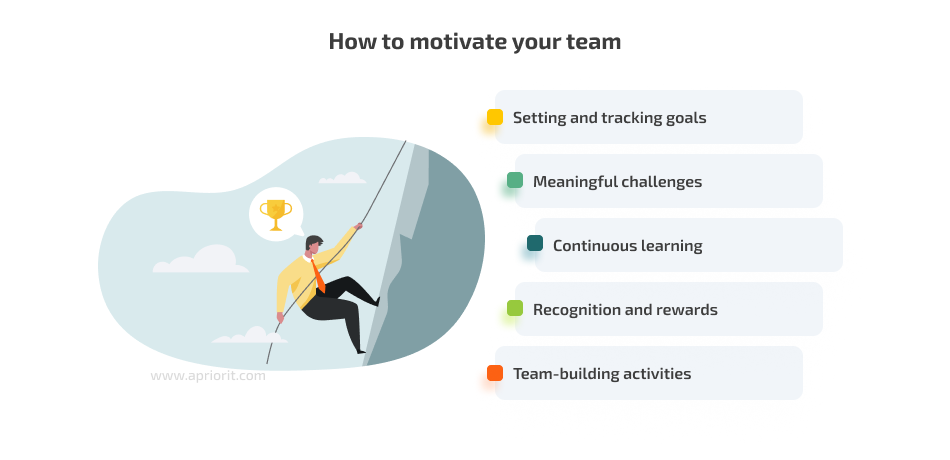
Setting and tracking goals. You can empower your team by collaboratively setting SMART (Specific, Measurable, Achievable, Relevant, and Time-bound) goals for each project phase. Progress tracking meetings, retrospectives, and results review events can help you celebrate important project milestones and identify areas for improvement together with your team. Goals will also help your team understand their impact on the project as a whole. This fosters a sense of accomplishment and keeps the team focused on achieving the shared vision.
Meaningful challenges. Challenging yet achievable tasks help keep the team’s motivation high. When tasks require some effort, your engineers can utilize their skills. learn new ones, and start thinking outside the box. Meaningful work that contributes to a larger goal ignites intrinsic motivation in the long run. At the same time, repetitive or monotonous tasks can lead to boredom and disengagement, which harms motivation over time.
Continuous learning. Invest in your team’s growth by offering opportunities for professional development. This could include attending conferences and workshops or providing access to online training resources for those who might need them. You can hold retrospectives, which promote continuous improvement and collaboration not through routine tasks, but through self-improvement of the team members, sharing their pains, and getting rid of potential blockers. By helping developers improve themselves, a PM can both secure new skills for their project and help team members feel valued.
Recognition and rewards. Recognize and reward both individual and team achievements. This could take the form of public recognition, bonuses for reaching milestones, or opportunities for career advancement. Recognition and rewards will reinforce positive behaviors and demonstrate that the team’s hard work is valued.
Team-building activities. Building strong team spirit boosts collaboration and motivation. Organize occasional team-building activities that go beyond work, encouraging collaboration and communication in a casual setting. As a result, your team members will have stronger relationships and a greater sense of belonging. Keeping the team dynamic and engaged is also key for further innovation and effective collaboration.
By implementing these techniques, you can create a work environment where intrinsic motivation thrives. Empowering teams with ownership, providing opportunities for growth, and recognizing developers’ achievements unlocks their full potential and leads to project success. However, this is easier said than done, as there are plenty of challenges in keeping your team motivated.
Read also
IT Outsourcing to Eastern Europe in 2024: A Guide for Businesses
Considering outsourcing to Eastern Europe for your tech project but don’t know where to start? Discover the average rates, key benefits, and specifics of IT service providers in Eastern Europe, as well as tips to make informed decisions when choosing a partner.

Overcoming challenges in motivating your team
Even the most well-intentioned efforts to foster motivation can encounter roadblocks. Overcoming these roadblocks quickly and efficiently is important if you want to maintain the same level of motivation throughout the development process. At Apriorit, we recognize these challenges as opportunities for growth and innovation.
Let’s take a look at some common challenges faced by IT project managers and discuss strategies to overcome them.
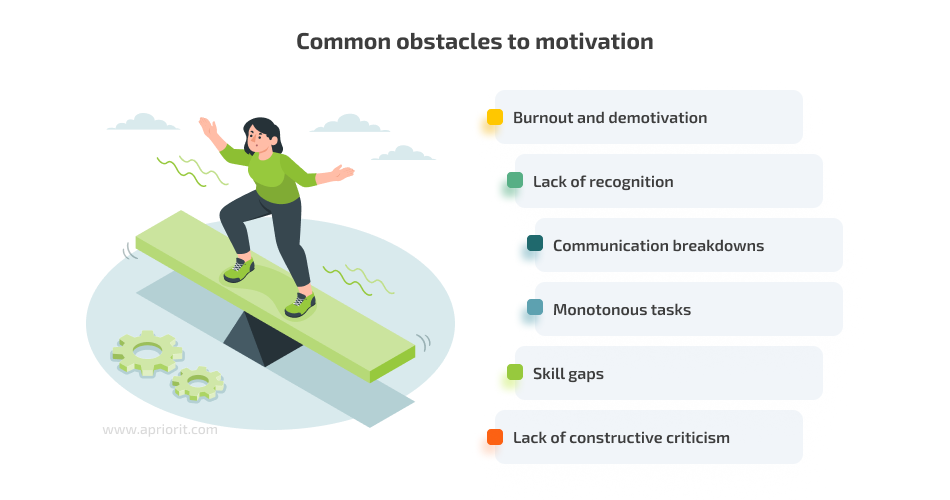
Burnout and demotivation. Most software development projects are demanding, including the pressure of tight deadlines, complex problem-solving, and ever-evolving technologies. As a result, team members may experience burnout. Signs of burnout include decreased productivity, increased frustration, and difficulty concentrating. This, in turn, can lead to a domino effect, impacting team morale and potentially delaying project timelines.
What can you do? To address this challenge, prioritize work-life balance and implement strategies to prevent burnout. This may involve effectively delegating tasks, providing adequate resources and support, and encouraging regular breaks to recharge. You can also set up 1-1 meetings to understand the reasons for burnout and introduce proper structure to the workload. Celebrate small wins and milestones to keep the team energized!
Lack of recognition. Nothing can demolish team motivation faster than the feeling of being undervalued or unrecognized. When individual and team achievements go unnoticed, team members may lose the sense of purpose that fuels their intrinsic drive.
What can you do? To effectively combat a lack of acknowledgment, team leaders and PMs have to make an effort to appreciate the efforts of their team members. You can do this through verbal praise, written commendations, or rewards and incentives.It’s always great to work with the customers in terms of providing feedback from their end in order to know how end-users feel your product
Communication breakdowns. Miscommunication and a lack of clear project expectations often lead to frustration and confusion among team members. Imagine a project where team members are unsure of their roles, the project’s priorities, or the overall vision. Uncertainty can stifle motivation, hinder collaboration, and ultimately lead to project delays or missed deadlines.
What can you do? To overcome this challenge, prioritize clear and transparent communication channels like Slack and Jira. For example, you might focus more on regular team meetings and one-on-one check-ins to boost communication and make sure everyone is on the same page.
Monotonous tasks. Repetitive, unchallenging tasks can quickly become mind-numbing. Team members with strong skills crave opportunities to learn and grow. When their daily tasks fail to provide intellectual stimulation, they may become bored and disengaged. This can lead to a decrease in focus, frequent errors, and a higher risk of missed deadlines.
What can you do? While not all tasks can be reassigned due to the specific skill set required, you can rotate tasks where possible to provide variety. Some members of the dedicated team may ask for more opportunities and more complex challenges that will leverage their unique knowledge. You can also hold brainstorming sessions to find innovative solutions, keep tasks interesting for all team members, and explain why this task is crucial for customers or end-users.
Skill gaps. Even the most experienced engineer has always something more to learn for a complicated project since the IT world is very dynamic. Team members may hesitate to take on new challenges or struggle to complete assigned tasks efficiently when they don’t have the required knowledge and tools.
What can you do? The most obvious and effective action you can take is to invest in training and development opportunities for all team members. Encourage knowledge sharing within the team to foster collaboration through pair programming, split tasks, and brainstorms. The best course of action, in the long run, is creating a culture of continuous learning that encourages asking questions and thinking outside the box. Also, you can always delegate unknown tasks to outsourced specialists and give your team a chance to focus on tasks within their expertise.
Lack of constructive criticism. Feedback is very important in the fast-paced world of IT, as it promotes growth and improvement fast and effectively. Without constructive criticism, team members may struggle to identify areas for development or feel uncertain about their performance on complex projects.
What can you do? Embrace a culture of feedback and open communication within your team where you provide constructive criticism to your workers in a respectful and supportive manner. Additionally, provide regular feedback sessions where team members can discuss their progress, receive guidance, and address any areas for improvement. This way, you empower your team to learn, grow, and excel in their roles.
Read also
Outsourcing Project Management: Concerns, Advantages, and Our Approach
Discover how a skilled project manager can help you optimize the development team’s efficiency and budget. Explore Apriorit’s approach to project management and learn how we address common concerns to ensure successful project outcomes. wanted to enhance VAD platform security and performance by adding new capabilities to their platform and needed quality support for existing features.
How do we motivate our teams?
At Apriorit, we’ve spent over two decades cultivating a culture of motivation within our company. We recognize the critical role of leaders in fostering motivation among dedicated teams. Our leaders go beyond managing tasks; they are skilled motivators who understand how to cultivate a thriving and dedicated team environment. Here are some of the strategies that have consistently fueled success and established a thriving work environment for our dedicated teams.
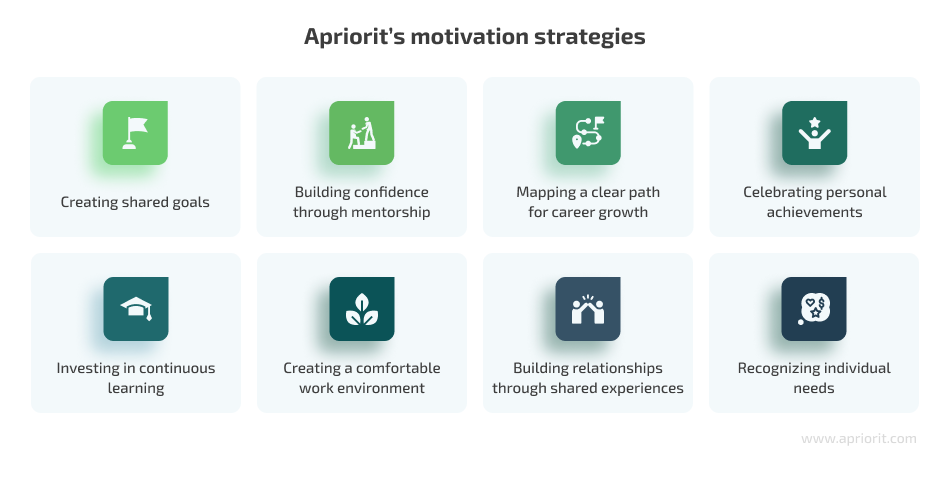
Creating shared goals. We go beyond simply assigning tasks; we unite our teams around a common goal. By rallying everyone towards a shared vision, we create a sense of purpose that goes beyond individual roles and fosters a spirit of collective achievement.
Building confidence through mentorship. Experienced team members act as guides for new team members, offering support, knowledge sharing, and valuable insights. This two-way street benefits everyone. Mentees gain confidence and expertise, while mentors solidify their leadership skills and pass on their knowledge to newcomers.
Mapping a clear path for career growth. Apriorit doesn’t limit career growth to a single track. We offer diverse opportunities for advancement, both within departments and across disciplines. This allows our team members to explore their strengths, develop new skills, and chart a personalized career path that keeps them engaged and motivated over the long term.
Celebrating personal achievements. Recognition is a powerful motivator. We take the time to acknowledge and celebrate both individual and team accomplishments. This could be a public shout-out in a team meeting, a personalized thank-you note, a company gift, or even a fun team outing. By recognizing achievements, we demonstrate that we value our team members’ contributions and keep them motivated to excel.
Investing in continuous learning. At Apriorit, we understand that staying at the forefront of the ever-evolving IT industry is crucial. For this reason, we invest heavily in training and development opportunities, such as Individual Development Plans. Our team members have access to a wide range of training programs, conferences, and workshops, allowing them to continuously improve their skills and keep their knowledge base current. This not only benefits individuals but also ensures our dedicated teams have the expertise needed to tackle complex client challenges.
Creating a comfortable work environment. We believe a happy and comfortable team is a productive team. That’s why we prioritize creating a work environment that promotes well-being. This includes offering flexible work arrangements, comfortable and modern office spaces, and dedicated relaxation areas.
Building relationships through shared experiences. Teamwork isn’t just about collaborating on projects; it’s about building genuine connections. We organize team events and activities that go beyond work, allowing team members to connect on a personal level and build strong relationships. This strengthens team spirit, improves communication, and creates a positive and engaging work environment.
Recognizing individual needs. We understand that a one-size-fits-all approach to motivation doesn’t work. Our project managers take the time to connect with each team member individually, discussing their goals, strengths, and areas for development. Such a personalized approach allows us to tailor our motivational strategies to each individual, making sure that everyone feels valued, supported, and empowered to reach their full potential.
By implementing these strategies, Apriorit has created a work environment where intrinsic motivation thrives. Thanks to that, our dedicated IT teams are not only skilled and experienced but also deeply engaged, passionate, and driven to deliver exceptional results for our clients. Motivated teams can deliver solid results and develop complex solutions, which is exactly what our clients expect from our collaboration.
Conclusion
Motivating dedicated teams isn’t just about boosting productivity but also about encouraging loyalty, improving team dynamics, and reducing turnover rates. To craft an effective motivation system and deliver exceptional results, you need more than short-lived methods of motivation. To learn how to effectively motivate your development team, you need to conduct a careful analysis of the goals and consider each team member’s interests.
At Apriorit, we believe the most sustainable and effective motivation stems from within. When team members find genuine enjoyment in their work and are driven by a desire to achieve shared goals, their passion becomes a powerful engine propelling project success. Our dedicated teams are driven by a culture of excellence and collaboration, making sure that motivation and results go hand in hand.
Ready to elevate your project with a dedicated team of experts?
Focus on your core objectives and the big picture. Entrust all the technical work to Apriorit’s capable engineers and project managers.


